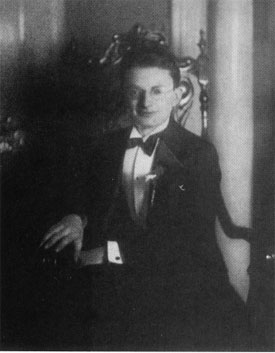





The Importance Of Being Izzy And The Death Of Dissent From All Governments Lie by Myra MacPherson In writing this book it has not been easy keeping up with the fast-breaking news about a man who has been dead for seventeen years. Lest you think I jest, reflect on this. In 2004, Philip Roth gave I. F. Stone a walk-on part in his masterful work of fact and fiction The Plot Against America. In Roth's mesmerizing “it can happen here'' tale of fascism triumphant, Charles A. Lindbergh, in real life the international aviation ace and Hitler admirer, has defeated FDR. On page 316 of the novel, I. F. Stone is carted off with FDR New Dealers Bernard Baruch, Supreme Court justice Felix Frankfurter, and other real famous men by President Lindbergh's gestapo-style FBI as pogroms begin in America. Roth's novel vividly relates the fear among American Jews in 1942 when fascism was a real threat. Back then, journalist I. F. Stone was among the alarmed who excoriated isolationist Lindbergh's coziness with the Third Reich.

Izzy with a grim group in kindergarden; third in the circle (foreground, left to right), in sailor suit and curly hair. What appears to be a fleeting apparition of owl-eyed Izzy rushes by in the background of real footage of a McCarthy hearing in George Clooney's award-winning 2005 movie on Edward R. Murrow, Good Night, and Good Luck. 
Katy and Bernard Feinstein with their toddler Izzy, circa 1908-1909. The twentieth century's premier independent journalist, known to everyone from the corner grocer to Einstein as Izzy, is honored on campuses that award I. F. Stone chairs, fellowships, and scholarships. Institutions rank his tiny one-man I.F. Stone's Weekly in the Greatest Hits of twentieth-century journalism. In one major study, Stone's Weekly placed number 16 in the top 100, be- hind coverage of Hiroshima, Watergate, the Pentagon Papers, My Lai, and the work of early-century muckrakers. As an individual voice, he placed ahead of Harrison Salisbury, Dorothy Thompson, Neil Sheehan, William Shirer, James Baldwin, Joan Didion, Murray Kempton, and other worthies. Some who once ruled Georgetown and political society such as columnist Joe Alsop and the acerbic H. L. Mencken, did not make the cut. Walter Lippmann placed 64. Such are the vicissitudes of life for journalists who once stood so high. “This kind of list is needed in journalism,” said Mitchell Stephens, of NYU. “Nobody thinks of journalism in terms of decades or centuries.'' It is important to examine why some endure. And Stone endures. He is quoted in the New Yorker and the New York Times, remembered as an inspiration by Bill Moyers and Seymour Hersh -- arguably the best investigative reporter today-- and anyone else who despairs of modern journalism, especially the unquestioning acceptance of governmental spin, He is a lone “courageous” voice remembered by Michael Cross-Barnet in a 2005 recollection of his own father's ruined career during the Red Scare: “The New York Times Shafted My Father.” Defending the Times editor Melvin Barnet, Stone had asked back then, “How can the Times editorially support the Fifth Amendment and discharge those who invoke it?” Bloggers bill themselves as the next Izzy. Then the right-wing chorus falsely called Stone a Red spy. The list goes on. 
Izzy’s father, Bernard Feinstein, in front of the family dry good emporium. Family rooms were in the back and upstairs, where Izzy read incessantly and was a most indifferent clerk when pressed into service. Stone went from a young iconoclast in the 1930s to an icon during the Vietnam War. In the fifties, he spoke to mere handfuls who dared surface to protest Cold War loyalty oaths and witch hunts. A decade later, he spoke to half a million who massed for anti-vietnam War rallies. He became world famous. Today, Izzy's remarkable immediacy leaps off the pages. Not only is he a sheer joy to read, his views take on vital importance, as if he had written them just this morning, illuminating the tumultuous first five years of the twenty-first century.
“We were just a couple of kids,” said Izzy, spiffy in “It is not a private quarrel between the Israelis and Arabs. It's a world concern -- and of great concern to America, as a great power, to have stability and peace, And there is no way to have peace without some modicum of justice. The Arabs cannot be held in second-class citizenship and bondage. If something isn't done pretty soon the lines may garden: each side will destroy its own moderates -- and then they will move on to destroy each other.” That was not about today's discord or the wall built by the Israelis to keep out the Palestinians in 2004, but Stone's sorrowful warning years ago. “Almost every generation in American history bas had to face what appeared to be a menace of so frightening an order as to justify the limitation of basic liberties -- the Francophiles in the days of the Alien and Sedition laws, the Abolitionists, the Anarchists, the Socialists in the days of Debs; Fascists, anti-Semites and Communists in our own time.” Some saw “compelling arguments for suppression.” Stone argued against this, claiming that a country founded on basic freedoms had “managed to get through before.” This was not about the excesses of the Patriot Act but about investigative assaults and secret surveillance of citizens in 1949.Then, as now, fear galvanized citizens into silent support. The terrorists of 9/11 and continuing worldwide terrorism made it easy to sell the Patriot Act -- and to resell it to a cowardly Congress as 2005 drew to a close. The very name echoes those deployed the Cold War Red Scare, when congressional inquisitors decided who was “un-American” and President Truman instituted the “Loyalty Oath.” Stone would have led the pack in uncovering -- once again -- illegal domestic spying in the twenty-first century and ripped into the Patriot Act for its trampling on the Bill of Rights, which included forcing clerks and librarians to turn over lists of what citizens read, and detaining a thousand “suspects” with no evidence. Jailed without charge, forbidden to see lawyers or family, the vast majority were innocent of federal crimes of terrorism. Bush's team had grossly inflated the number of terrorist actions. Justice Department stonewalling thwarted media access, yet available reports were overlooked. Such documents would have had hound dog Stone salivating at the joy of the hunt. 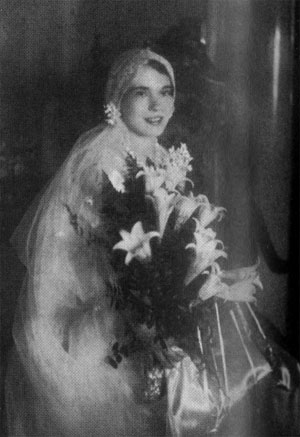
Esther the bride, with lilies and resplendent in satin and lace, displaying, as their daughter, Celia, wrote, “the power of that candid gaze . . .” “There still seem to be many worthy gentlemen . . . who wish to anchor the world in a sea of narrow minds (including their own) and hold it there, lest it move forward . . . They are utterly out of place in this age of rationalism.” This was not about the current forces of Creationism but the first go around, with the famous 1920s Scopes Monkey Trial and written by a fourteen-year-old Izzy, This book combines biography, a historical treatise on the press, and Stone's running commentary on twentieth-century America. All are necessary to draw some present-day lessons from the life and times of I. F. Stone. At pivotal points in their careers I have twinned outsider I. F. Stone with insider Walter Lippmann because they are dynamic examples of opposing approaches to journalism. Presidents and kings were so much a part of Lippmann's life that when he visited Paris, his forwarding address was in care of Charles de Gaulle. He wrote speeches for presidents and never saw the dichotomy, lecturing younger colleagues like James (Scotty) Reston to remain detached. “Walter was more engaged with more presidents from Wilson to Lyndon Johnson than anybody in the press! He was always in the White House,” Reston once exclaimed to me. Meanwhile, Stone was blackballed by the National Press Club after his premature gesture of civility in a Jim Crow era, inviting a black to lunch there. A vital companion theme is the repression of dissent that Stone and others faced in the twentieth century and which continues to this day. 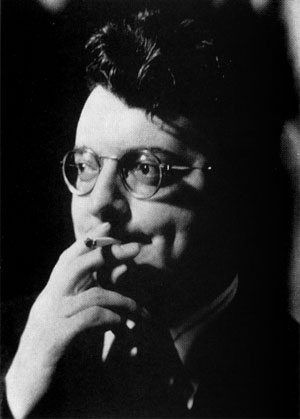
Izzy in his earlier smoking days. Stone never confused dissent with disloyalty, as mainstream media and the government so often do. Stone fervently loved this country, viewing dissenting voices as crucial for keeping it true to its ideals. Since Stone wrote and thought everything out loud in the public arena, there are no private papers or memos and only sparse correspondence -- the stuff of conventional biographies. Because of this, one extraordinary lie has been promulgated by the far right bent on besmirching Stone's legacy. They repeat the falsehood that Stone's family burned his papers, hinting at some dark conspiracy. They deduced this from Nation writer D. D. Guttenplan's innocent observations that Stone had left no papers. After more than a decade of examining Stone, I can sadly attest to Guttenplan's accuracy and applaud his continual debunking of Izzy-the-spy lies that the neocons spread. However, I hope to provide new insights from numerous unpublished reminiscences of family and friends, unpublished interviews with Stone, his massive and unpublished FBI file, recently declassified Russian, Chinese, and North Korean documents, and his own riveting words that flowed by the millions during nearly seventy years of writing and speaking. Stone's style combined a comic's gift for one-liners, an eye for the “significant trifle,” and trenchant analysis of world affairs. 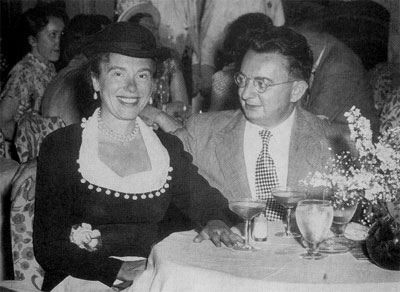
Esther and Izzy, all dressed up for cocktails and dinner at the Waldorf-Astoria, circa late 1940s-early 1950s. His work helps evaluate the best and the worst in today's journalism. Although Stone inspired many, he was too much of an original to be fully emulated. His vibrancy and zest for life, his enthusiasms for every- thing from disco dancing to Demosthenes, his curiosity and hound-dog tenacity, would have made I. F. Stone unique in any arena. But he was especially so in Washington. Most of the time, he simply didn't give a damn if he was an outcast. He slaved to make history and current events “fun”-- a favorite word. He struggled always to write his “souffles,” articles and books as airy as confections despite the substance larded into each sentence. Best of all, commented journalist and novelist Nicholas Von Hoffman, ''There are so few troublemakers and he was a wonderful troublemaker, He had such wonderful guts. He defied the social fears which make cowards of most of us. He was his own person in the ice age of big, controlling institutions and organizations. He could stand alone and stand apart and therefore stand for what he believed in.” Stone was nothing like today's prepackaged bloviators pickled in self-importance who offend and lampoon easy targets that feed their flocks' prejudices. An equal-opportunity deflator, when Stone perceived injustice, inequity or lies billed as truth, he sometimes turned intimate fans into intimate foes. Izzy collected countless critics left, right, and center, alienating just about everyone at one time or another. He loathed pontificating, thumb- sucking pundits and carefully crafted a breezy, provocative style. Never far from his autodidactic grounding in the classics and philosophy, Stone possessed a memory of confounding accuracy; a scholar's grasp of the past that he applied to current events with dazzling relevance; a trial lawyer's proclivity for the tough question. Coupled with these attributes, Stone's skepticism regarding the professed nobility of government intentions served him well. 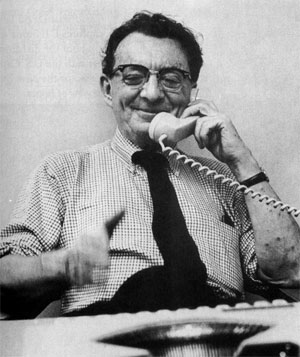
As a younger journalist, Izzy enjoys a scoop on the phone as he punches the typewriter with his right hand. In the same year that Stone died, 1989, Nightline's anchor, Ted Koppel, said of the establishment media, “We are a discouragingly timid lot . . .people whose job it is to manipulate the media know that . . . many of us are truly only comfortable when we travel in a herd.” Even Stone's great outspoken colleague Murray Kempton once told me, “I have a tremendous need to pass a test of fraternity when I'm on a story. I'm much more of a herd man than lzzy ever was.” Stone was comfortable traveling alone. Government leaks tossed out at private dinner parties were as suspicious as hand grenades to him. And a reporter had to “bone up” in advance and ask good questions to get both news and respect from officials. "You can't just sit on their lap and ask them to feed you secrets -- then they'll just give you a lot of crap." The First Amendment was Stone's bible and Jefferson his God. Stone never stopped preaching against secrecy in government. "Inevitably such organizations (the FBI, CIA, NSA) become means of inhibiting the exercise of freedom of liberties and intimidate people." Few but Stone had the nerve to ridicule FBI director J. Edgar Hoover at the height of his power, calling him a "glorified Dick Tracy'' and "the sacred cow," knowing full well that Hoover would retaliate. From the thirties to his death in 1972, Hoover endlessly hounded Stone, amassing thousands of pages, staking out such subversive activities as buying cigars, picking out groceries, writing letters to his hearing-aid company. "Secrecy is hardly new," said commentator Bill Moyers, who worked for one of the legendary White House liars, Lyndon Johnson. Speaking of today's President Bush, Moyers added, "But never has there been an administration like the one in power today -- so disciplined in secrecy, so precisely in lockstep in keeping information from the people at large and, in defiance of the Constitution, from their representatives in Congress." 
The Stones arriving in New York by ship from Paris in 1951. For the first five nightmare years of Bush's reign, a compliant White House press corps, known to some in the trade as "access whores"; a conglomerate Murdochian right-wing drift; "liars for hire'' paid by the administration to tout its programs; deferential acceptance of administration fibs -- all are disgraceful capitulations to power. It is frustrating to observe such follies where mainstream media shies from accurately informing the public, burying major stories in an avalanche of celebrity trash. During the Iraq invasion, jingoism replaced journalism. With pancake makeup and microphones at the ready, an enthralled crew of the embedded embraced battle (many of whom had forgotten their own devotion to ducking the Vietnam War). Early reports were tailor-made for Army recruitment posters, with the exception of some hard-hitting re porters such as Mike Cerre for ABC-TV. Only after President Bush ignored the tragedy of a Hurricane-wracked New Orleans, only after U.S. troop deaths in Iraq reached 2,000, only after the cost of war reached into the billions did mainstream media begin assertively challenging what had been a highly scripted five-year media propaganda blitz. A miracle would be the day that the media did not show up for hollow photo ops such as the "Mission Accomplished'' and ''Plan for Victory'' obscenities. As 2005 came to an end, indictments fell like snowflakes, and journalists began reporting on a host of Republican scandals, leading with the resignation of Cheney's top aide, Scooter Libby, after his indictment on five counts--obstruction of justice, perjury, and false statements in the probe of White House leaks to journalists regarding the outing of CIA agent Valerie Plame. (Not until April 2006 revelations of Libby's testimony did the mass media start to question Bush's sound-bite denials of his involvement in the leaks.) The Washington Post's Dana Priest broke the story of CIA secret prisons in Europe; the Los Angeles Times broke the story of a Defense Department contractor that paid Iraqi journalists to run fake upbeat war stories in Baghdad media; Time's embedded reporter Michael Ware exposed phony administration claims that an assault was primarily led by Iraqi forces. Still, it took the New York Times a full year to disclose that it had learned of warrantless wiretapping of U.S. citizens. No discussion of a free press is without a heated look at "objectivity'' -- a deceptively simple concept. At its very worst, what is collected in an "objective" fashion can be a major trap (witness every single story garnered from a spin-minded administration source; the prime example is the New York Times's Judith Miller's -- as well as reporters on other publications -- credulous reporting on WMDs, which obviously seemed "objectively accurate'' to their editors at the time). Because it was the vaunted Times, television followed with inaccuracies based on its cover- age. After the Times finally chastised Miller for her blind acceptance of false WMD information and her dealings with Libby, her career there was over. It is time to resurrect Stone's warning: "You cannot get intimate with officials and maintain your independence, No matter whether they are good guys or bad guys don't get intimate with them or you'll lose your independence and they'll use you." The fifteen-second sound bite is carefully crafted by spin doctors to mask or deflect news and is religiously regurgitated on TV. 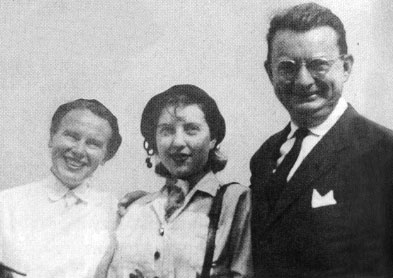
Esther and Izzy say goodbye to their daughter, Celia, as she sails for Paris for her junior year abroad, early 1950s. Said Izzy, "A newspaperman ought to use his power on behalf of those who were getting the dirty end of the deal. . . And when he has some- thing to say, he ought not to be afraid to raise his voice above a decorous mumble, and to use forty-eight-point bold." "Izzy's point was that reporters were not stenographers," said investigative reporter and author Scott Armstrong, who organized the campaign that convinced President Clinton to veto the Official Secrets Act -- a provision that would have for the first time in U.S. history criminalized the unauthorized disclosure of government information by federal employees and whistle blowers. "Izzy was eternally disappointed that so many were not willing to find the public records and say, "These two points have been said and it's wrong. Finding Real News means searching beyond the carefully crafted word of official dissemblers. Faux objectivity is when one gets lies, in the guise of formal statements, from the Robert McNamaras and the Scooter Libbys and Tom DeLays and Kenneth Lays and presidents and prime ministers. Real objectivity is when reporters dig into documents, find a credible whistle-blower source, or learn things on their own and verify them. As a columnist, when he was not doing straight reporting, Stone committed no crime when he voiced his opinions or marshaled facts to fit his ideology and principles. Nonetheless, his enemies on the right, who consistently do the same, castigate him for the sin of having opinions. Stone advised young writers to keep in the back of their minds, no matter how impassioned their feelings, that "you may be full of BS'' and, unlike many pundits, was not overly concerned about being viewed as right or wrong. He knew that such analysis depended on the prevailing political, social, and cultural framework of the moment. "Either you're going to sit on your ass and write your preconceptions or you're going to be a good reporter and that means being inconsistent. You change your mind or admit an error because things are very complicated and people do change and it's fascinating to watch them." Stone also learned to "go into the bowels of government where the really good sources are. They are good public servants, very often breaking their hearts with frustration.They're the best kind of source." As Bill Kovach, chairman of the Committee of Concerned Journalists, notes, ''Izzy's lasting strength rests on his fierce independence and on documentation. His independence is what inspired us and in many cases shamed most of us much of the time. But it was the material Izzy Produced from his close reading of the official record and careful listening of official words that was valuable to the public and to history. When Izzy allowed his deep beliefs to override his journalism or verification he got himself into trouble. But his objective method -- his objectivity as a journalist -- is what brought him back to earth." Scotty Reston recalled his tribute when Lippmann turned seventy-five: "I said that the great achievement of Lippmann was that he was a great definer of issues and that he used the news as a peg for his philosophy of government. He defined the issues better than anybody else. Well, he didn't like that. He wanted to be judged on the basis of whether what he had written and what he had proposed was right or wrong. And that record was not very good." At Stone's death in 1989, a laudatory Washington Post editorial nonetheless chided Stone for "misappraising" some societies and rulers. Scoffed Von Hoffman, "They should look to themselves and the establishment press who urged going slow on the 'Negro question' when Izzy was taking black judges to lunch, couldn't see--and even defended-- Vietnam while Izzy was seeing something else, or when they played into Cold War fanaticism and helped the China lobby to exist for years." A longtime anti-stalinist, Von Hoffman said, "On Russia, certainly Izzy can be criticized, but in so many other arenas his vision stands up far better than most establishment journalism." Stone was far ahead of the pack regarding numerous momentous and pivotal trends in twentieth- century history: the American labor movement, Hitler and the rise of Fascism, disastrous Cold War foreign policies, domestic purges, covert actions of the FBI and the CIA, the greatness of the civil rights movement, the horror of Vietnam, the strengths and weaknesses of the anti- war movement, the disgrace of Iran-contra, and the class greed of Reaganomics. Initial research on this book began in 1990 when Google and bloggers were unknown terms. The Library of Congress was home while studying Stone's roots and political leanings, early socialist and labor movements, the New Deal, the cold war and the "Red Menace'' decade, Stone's controversial book on Korea, and civil rights. Many of the 1960s civil rights activists and anti-Vietnam War protestors who made I. F. Stone's Weekly a success never knew his rich past. Child publisher at fourteen, in 1933 the twenty-five-year-old Stone was the youngest editorial writer on a major daily, slashing away at Hitler, whose ascendancy was largely ignored by Walter Lippmann. As a thirties radical, Stone mingled with the famous: Charlie Chaplin and Orson Welles, Clifford Odets and John Dos Passos, James Thurber and Heywood Broun, Lillian Hellman and Dashiell Hammett. Future talents who were teenagers in the forties--Joseph Heller and Jules Feiffer and Philip Roth and E. L. Doctorow--read Stone in PM and The Nation. Stone wrote millions upon millions of words on everything from Woodrow Wilson's peace initiatives to Ronald Reagan's Star Wars. He had a roiling history with fellow Jews; beloved when he became the first reporter in the world to travel illegally with holocaust survivors to Pales- tine, he was soon denounced by some as a Jew hater for championing the rights of displaced Palestinians. Stone achieved the remarkable; he reached the age of eighty-one without growing old, Buoyed by a childlike ebullience, he often used a line that Moyers now loves to repeat when he praises Stone: "I am having so much fun I ought to be arrested." One would like to simply dismiss, for example, the rants of Ann Coulter, the Queen of Sleaze, whose aversion to the truth is matched by an utter lack of decency. Before the Internet, talk radio, and cable TV, such extremists were relegated to fringe publications. Today, the far right, no matter how baseless their arguments, have found prominence and financial heaven, Sadly, every uncorrected falsehood, such as her lies about Stone, remains in the blogosphere, often repeated by a mainstream media scrambling for an audience. Therefore when it applies to Stone or his work, material that surfaced well after his death has been addressed in the body of the book. Unfortunately, Stone cannot defend himself as he did so aptly in life. He once described to me how he felt about politicians and journalists who had shunned him during the fifties: "I used to walk across the lawn at the Capitol and I would think, 'Screw you, you sons of bitches. I may be just a goddamn Jew Red to you, but I'm keeping Jefferson alive! '' Stone was lauded for his ability to find exposes in documents that other journalists were too lazy to read or overlooked when they did read them. Again, it is not so easy to take a fresh look, to disabuse oneself of the perceived wisdom that is the stock-in-trade of government documents and press conferences. Friend and fellow journalist Christopher Lydon said, "Izzy was the only journalist, surely, who comes close to the notion of genius." Stone would not have disputed that opinion. Fresh from his best- selling triumph The Trial of Socrates, eighty-year-old Stone told an audience that he had written a speech for Socrates. In fact, he said, it was a damn good speech. In fact, "I think that if Socrates had delivered it to the jury, he would have gotten acquitted.'' Stone enjoyed the ensuing laughter but in no way felt his assessment was a joke. One criticism of Stone is that he gave Communist dictators more slack than right-wing demagogues during the thirties and forties, Even friendly critics argued that he was late to voice full-fledged criticism of Stalin's horrors. When he did, in the mid-fifties, his passionate admission lost him subscribers who still clung to the Bolshevik dream. However, his critics are incorrect when they paint him as uncritical of the USSR or American Communists; as far back as the thirties, Stone was assailing the system's repression. He belittled the "little Stalins'' in the American Communist Party (CPUSA). During McCarthyism, Stone repeatedly advised America to not "go the way of Russia." Stone's inconsistencies as well as his thinking on this subject are addressed. Stone was attacked for thinking that the road to peace with Communist regimes was through diplomacy rather than tough threats of war. Irony did not escape him in 1988, at the age of eighty. "Who would have thought it?" he remarked, "First, President Richard Nixon -- that old Red-baiter -- met with Mao. Now Reagan, the great opponent of the 'evil empire'! Who would have dreamt that he would head for a summit with Gorbachev and drop back from the nuclear abyss?" (Stone chuckled at how Reagan's actions had alienated all of the "kooks" in his corner.) Stone couldn't have been more pleased that these two heroes of the right had approached the Communists in the manner that Stone had been vilified for advocating all along. As columnist Robert Scheer wrote in 2005, the terrorizing predictions of a united international Communism never happened. Long ago, Stone was alone in American journalism when he argued that the domino theory was wrong, that Communist leaders played one against the other and their ideological internationalists were subdued by pragmatists. Vietnam now is a prosperous free-enterprise partner with the United states. Historical rivals China and Vietnam "compete for Shelf space in Costco and Wal-Mart," providing cheap labor for capitalism, noted Scheer. As outraged as Stone had been, he asked why the United States had not recognized this pattern, particularly Ho Chi Minh's nationalism. Instead 3 million Vietnamese and fifty-eight thousand Americans died in a war without purpose. Scheer added, "Sound familiar?" Stone did not live to see the collapse of the Soviet Union, but he had traveled a long road since his adolescent enthusiasm for the 1917 Russian Revolution. In later life he ardently befriended Communist dissidents. "There are great risks in a free society, but the risks of dictatorship are even greater. . . . The only thing that made it look good was the absence of a free press and a solid wall around it." Copyright 2006, reprinted by permission of Scribner, an Imprint of Simon & Schuster, Inc. The False Charges Against I.F. Stone Arise From Two Sources ISSUE I: Stone Refused To Let a Soviet Press Attache pay for his Lunch. This was, ironically and incredibly, blown up by an unscrupulous smear-artist into proof that Stone had previously taken money from the Soviet Union and was a paid Soviet agent. Stone had, from time to time, lunched with a Soviet Embassy press attache named Kalugin. There is no evidence that Stone knew that Kalugin was working for the KGB but he was. And decades, later, in an interview with British journalist Andrew Brown, Kalugin alluded to these lunches with a “well-known American journalist” and said that, after the 1968 Soviet invasion of Czechslovakia, the journalist would not even permit Kalugin to pay for the lunch … Brown’s report of these lunches applied the word “agent” to the journalist and referred to the journalist telling Kalugin, that he “would never again take any money from us”. But Brown said, later, after consulting his notes, that he never understood Kalugin to mean “paid” agent, that he had used the word “agent” as meaning “useful contact”, and that the “take any money” reference meant that Stone would not permit a Soviet employee to pick up the check for lunch then, or in future, as he had sometimes permitted before.[1] When a New York Review of Books editor asked Brown what exactly had Kalugin said, Brown reinterviewed Kalugin to confirm his understanding. In the second interview, Kalugin flatly denied that he had mentioned Stone as a paid agent and said that the reference to money was that Stone “refused to be paid for the lunch. That’s all.” Brown wrote about this in the New York Review of Books.[2] But Brown’s unfortunate original drafting had opened the door to an attack on Stone by Herbert Romerstein, a former employee of the House Un-American Activities Committee. His point of view is amply described in his response to Brown’s letter in the December 1992 issue of the New York Review of Book [3]. A companion response in the same issue by a lawyer Martin Garbus, who had had dealings with Romerstein, calls Romerstein “utterly untrustworthy”. Garbus, who had interviewed Kalugin himself, said that Kalugin had told him that Romerstein had “misreported” a conversation which Romerstein had had with Kalugin. Garbus said “the entire story circulated by Romerstein and Accuracy in Media, the right-wing pressure group, is scurrilous and false.” [4] Others who interviewed Kalugin and received similar comments opposed to Romerstein’s position include Don Guttenplan, who wrote about Kalugin’s denials in both the Nation and the New York Post, and Myra MacPherson, who interviewed Kalugin in 2006 and was told “We had no clandestine relationship. We had no secret arrangement. I was the press officer...I never paid him anything. I sometimes bought lunch.” [5] Stone was not the only person who maintained contact with Russian Embassy officials; many journalists did, including the famous Walter Lippmann. In fact Lippmann, code-named I for Imperialist in the Venona Files, was far more cooperative with this same KGB agent/press attache.[6] ISSUE 2: According to secret Russian messages during World War II, a Soviet official approached a contact, code-named Blin, asked for some unspecified help and offered money. Right-wing commentators allege that this person was Stone but it obviously was not. Blin refused to be recruited by the KGB precisely because he was afraid of bringing himself to the attention of J. Edgar Hoover. But Stone had been attacking Hoover vigorously since 1936. [7] Since Stone was not afraid of attacking Hoover and Blin was afraid of Hoover, Stone was not Blin. In their book Venona: Decoding Soviet Espionage in America, historians John Earl Haynes and Harvey Klehr discuss BLIN in VENONA Project cables.[8] Venona transcript #1506, October 23, 1944 from the New York KGB office to Moscow, states that Blin said, after a meeting with KGB’s Vladimir Pravdin, that he is "not refusing his aid," but "had three children and did not want to attract the attention of the FBI." FBI headquarters said Blin “appears” to be Stone but, in fact, the FBI argued among themselves about who Blin was and had another suspect for being Blin, named Ernest K. Lindley, who also had three children .[9] Some FBI agents noted that Blin should have been someone “whose true pro-Soviet sympathies were not known to the public...” and hence could not be Stone and the agents gave other reasons also.[10] Most important Stone was not showing any fear of attracting FBI attention, as Blin did, but was attacking J. Edgar Hoover regularly. So Blin was afraid of attracting Hoover’s attention but Stone was not. Hence Blin was not Stone. In any case, John Earl Haynes and Harvey Klehr, in their definitive survey of the Venona materials, say: “There is no evidence in Venona that [Blin or Stone] were ever recruited by the KGB.” And records of investigations of Stone from 1953 through the 1970s by the FBI, CIA, Army, State Department, and U.S. Postal Service have been declassified; years of tailing by agents, informants, illegal car searches, and even pawing through his trash produced not a shred of evidence of clandestine activities. Had Stone done anything wrong, US authorities would have found and disseminated it, since Hoover hated Stone.
A new book entitled Spies charges that I.F. Stone, “consciously collaborated” with Soviet intelligence from 1936–38. Consistent with the title, the authors of Spies feel obliged to go on to strengthen the charge by saying, parenthetically: “—that is to say, he was a Soviet spy—”. And the book is getting publicity on this notion that it reveals Stone to be a “spy”. Its authors are John Haynes, Harvey Klehr and Alexander Vassiliev. But Stone had no access to classified information and, in the fragments of information copied from the KGB files to support these charges, there is not the slightest indication of espionage. So even seasoned observers of the spy world are describing this charge of “spy” as an “unfortunate” exaggeration. Indeed, conscious collaboration does not even necessarily describe an “agent”. Unless one has a clear grasp of what exactly is being attempted in the collaboration and at whose suggestion, the “agent” might just be an “activist”. Stone was determinedly anti-fascist in the 1930s and the one anecdote in the fragments from the KGB files, an anti-fascist maneuver in Berlin, could have been started at Stone’s initiation—in which case, the Russians would be acting at his direction, i.e., would be his agent. In any case, it was already known--in no less than four very positive biographies of I.F. Stone—that his goal in the 1930s was a united popular front between Russia and the West against the then dominant threat of fascism. That he would collaborate in that goal with all and sundry is no surprise. That he subsequently denounced the Russian Government for the Nazi-Soviet pact confirms this, as does his later record. Twenty years after his death, I.F. Stone's reputation continues to be attacked by critics, a tribute to his stature. Decades old KGB files are notoriously self-serving. The rebuttal to them that is missing in the controversy is Stone's own version of those events.
|
